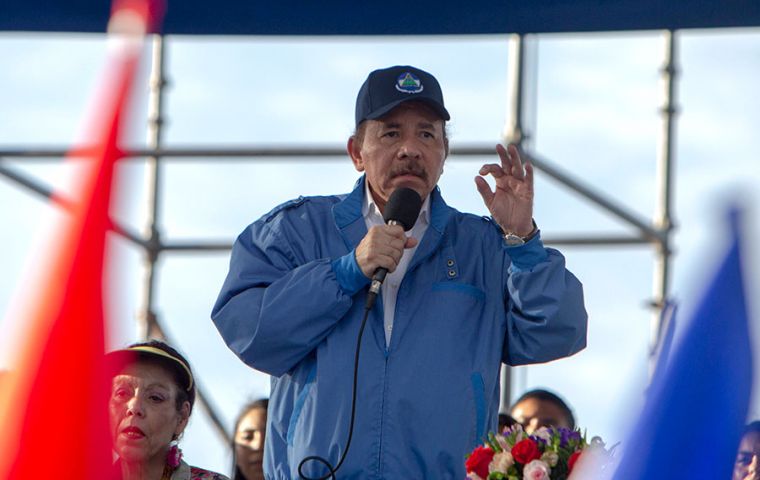MercoPress. South Atlantic News Agency
Ortega's gov't celebrates ICJ ruling in favor of Nicaragua
 Managua ratified “its firm commitment to the international rule of law and the peaceful settlement of disputes between States.”
Managua ratified “its firm commitment to the international rule of law and the peaceful settlement of disputes between States.” The Nicaraguan Government of President Daniel Ortega Thursday celebrated the International Court of Justice's ruling which found Colombia was in breach of international law when issuing Presidential Decree 1946 in 2013.
As per the new ruling, Nicaragua will be able to grant fishing “and any permit for exploration and exploitation of resources in its areas,” while Colombia's decision to allow vessels under its own flag to explore the area in the Caribbean Sea around the Island of San Andrés was void.
“Today, the Court has issued a final, definitive and binding judgment in which it has ruled in favor of Nicaragua by confirming that Colombia implemented a State policy that has violated the jurisdiction and sovereign rights of Nicaragua,” said the Nicaraguan Government in a statement.
According to Managua, the UN tribunal determined that Colombia interfered with Nicaragua's fishing activities, marine scientific research, and naval operations in its exclusive economic zone, in addition to imposing conservation measures on Nicaragua's natural resources and marine environment.
Managua stressed that the ICJ also instructed Colombia “to reform its legislation in accordance with customary international law, in particular the provisions of Presidential Decree 1946 and its reforms, in such a way that they do not cover areas belonging to Nicaragua nor do they arrogate powers incompatible with international law.”
The Nicaraguan regime also highlighted that, according to the ICJ, they had “not violated any historical fishing rights of the Raizal population of the Archipelago of San Andres and Providencia.” The country had also offered to seek an agreement to address “the situation of the Raizal population of the Archipelago,” which was viewed by the judges as “a positive gesture.”
“The ruling has made it explicitly clear that Nicaragua is the sovereign State to extend fishing permits, and any permits for exploration and exploitation of resources in its areas,” Managua stressed.
Also to “conserve the marine environment of its entire exclusive economic zone, among others, in accordance with international law, the Cartagena Convention and the Protocol relating to specially protected areas and wildlife,” it added.
In Managua's opinion, the ruling also confirmed that the Nicaraguan Caribbean Biosphere Reserve, created in 2021, was within the country's jurisdictional areas “in accordance with international norms.”
Nicaragua also vowed to “take the necessary steps to adjust its legislation with respect to its straight baselines in the Caribbean Sea so that they can fully comply with the recommendations of the high court.”
The Central American country then ratified “its firm commitment to the international rule of law and the peaceful settlement of disputes between States.”
Read also: Colombia dealt judiciary setback at The Hague




Top Comments
Disclaimer & comment rulesCommenting for this story is now closed.
If you have a Facebook account, become a fan and comment on our Facebook Page!